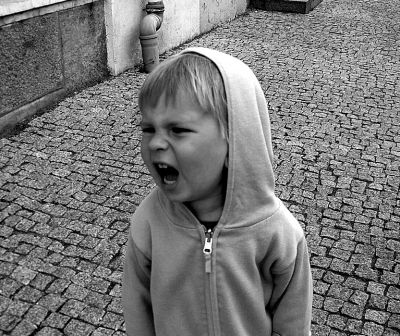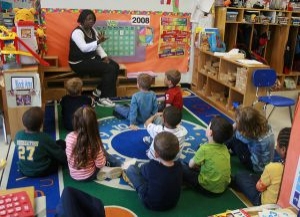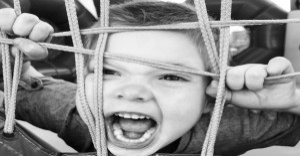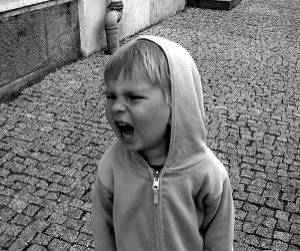All children deal with anger on a daily basis. Thinking about it as a child, there is a lot to be angry about. Elder people telling them what to do, not being allowed to get what they want, they fail at many things they try…it’s frustrating at times. As an adult we are able to deal with these setbacks in a social acceptable way, however a child doesn't have the ability or the understanding to deal with their actions when they become angry, in an acceptable way.
Now it's perfectly normal for a child's emotional development to feel anger however it's the way they handle their anger which becomes an issue at times. Some children when they feel angry, throw tantrums, become abusive, scream, kick and bite. In these instances, it's possible a child has loss of self control and at this point needs help in managing their anger.
The Angry Child
Anger is an emotion. It usually presents itself, in response to danger. It is also a form of self expression and for a child sometimes it’s a way of becoming independent. Many situations can trigger a child's anger and this can even lead into aggression. Children may attack each other through physical fighting or verbal abusing and in some cases a child may even begin to show aggression towards a parent.
In these circumstances it's important to step in and help your child deal with their anger. Your child has lost control over their emotions and cannot manage the feeling of anger in an acceptable way.
Through effective anger management techniques, you can be assured that your child will be dealing with their anger in a much more appropriate way.
The Younger Angry Child
There will be times that you will notice your younger child become angry during certain circumstances. There could be a variety of reasons for this which may include:
- Unable to communicate wants and needs to you.
- Doesn't know words to express what they are feeling.
- Feeling sick or tired.
- Frustrated at not being able to accomplish a set task or activity.
- Over excited and over stimulated.
It’s important that you try and pin point the circumstances that arise that make your younger child feel angry. By observing your child during different situations you will be able to identify a pattern of why they become angry and easily put a stop to it. For example, your 2 year old child may begin throwing toys across the floor and start screaming. Through observations you have noticed that your 2 year old only does this when she can’t get the puzzles in the correct position. So, simply give her a less challenging puzzle to complete until she gets her confidence back and then try the puzzle again.
Even though your younger child may not be able to verbally express what their problems are, by observing you will definitely be able to spot a pattern and sooner or later help your child overcome their angry feelings.
Dealing with Anger when it Occurs
When you see your child becoming angry and beginning to lose some control of the situation, it's important that you step in and help your child take control of their anger. Below are some simple strategies to help you deal with your child's anger when it occurs.
Be calm - The first thing you need to do is stay calm when your child loses control of their anger. Your child will be watching with how you deal with the situation. When you are calm and relaxed when handling the situation, your child will also begin to calm down easily.
Stop the cause of anger - It's important to separate your child from the person they feel like hurting, so make sure you get them away from each other. Toys and situations can also be the cause of anger with children. If this is the case, simply remove the toy from your child's possession for a short period of time or if it's based in a certain situation (at the park, in the shopping mall), it may be helpful to remove your child from that area until they have calmed down. At this stage, it's vital to help your child to calm down. Offer your child a glass of water and encourage your child to take deep breaths. Try to distract your child with an activity they can possibly do alone.
Just remember, there is no point discussing the causes that led up to the outburst of anger with your child at this point. Your child will still be dealing with their emotions and trying to calm down should be the first thing. After some time when your child has reached their normal level, you can discuss what happened and what caused the feelings of anger in the first place. As an adult when you are feeling angry, the last thing you want is someone coming to you and shouting at you for what you did. Normally you want to gain control over your emotions and then discuss what took place. A child is no different. Just because they are small it doesn't mean that they don't need the same consideration you would give to an adult.
Tips & Techniques
When you begin discussing the incident with your child there are a few simple techniques you can use to help your child understand that there are appropriate ways of dealing with their anger.
Please note: After each of the techniques listed below, there are two examples in italic font. The scenarios are: 1) a little girl called Sarah who is upset at having to leave a party early and 2) Big sister Alana is upset because her little brother her toy without asking.
Identify and name the feeling behind your child's anger
- Scenario 1 - “Alana, I can see that made you really upset”,
- Scenario 2 - “You're disappointed we have to leave now”.
Show understanding by putting your child's feelings into words:
- Scenario 1 - “You are feeling upset because your little brother took your cuddly toy without asking”,
- Scenario 2 - “You are feeling disappointed because you want to stay longer”.
Consider other person's feelings: With a little help from you, a child can begin to show empathy. Try and get your child to understand the other person's point of view.
- Scenario 1 - “Joey just took your cuddly toy because he thought you didn't want it anymore”,
- Scenario 2 - “It's time to go and pick up mummy from work, she won't be able to get home if we don't go and pick her up”.
Talk through compromise and solutions: Help your child find a compromise that both parties can agree on.
- Scenario 1 - Joey should ask before taking any of his Alana's toys and she will find Joey a toy he can play with
- Scenario 2 - Daddy can remind Sarah 10 minutes before they leave the party so she doesn't leave unexpectedly and mummy can come to the party too.
- Apologizing often helps too.
When Anger Becomes Aggressive
At some stage, there will be times when a child's anger will become to overwhelming for them to control, which often results in physical fights between siblings and friends. Below are a few techniques you can use when dealing with your child's aggression.
Stop the situation: It's important to isolate both children. Get them both into separate rooms and re-assure both children that they will be safe.
Take control: Let the children know that you're in charge when they are out of control. “No fighting, if you can’t stop fighting with each other than I will make you stop.”
Follow Consequences: A child must face consequences for their actions, if they are to learn to stop and think before they act. “If you can't play together without hurting each other, then you can't be together. If you want another chance to play together, see if you can remember this”.
Forgive & Forget: Children need to be reassured that their actions haven't turned them into “bad” children. Children often apologize and make up when their feelings of guilt begin to emerge. Guilty feelings come from knowing what they did was wrong, understanding that they did hurt someone else and hoping next time to deal with the situation better.
Helping a Child Deal with Anger
There are certain activities which you can introduce to your child to help them cope with such intense emotions. It's important to introduce a variety of both physical and creative activities to help your child deal with strong emotions. These include but are not limitless to:
- Drawing / Painting – Both of these activities provides your child with an appropriate outlet of dealing with their anger. Set up a table/ area that your child has drawing or painting materials easily accessible, which they can use freely.
- Play dough / Manipulation Exercises – This activity allows a younger child to release any emotional stress that they experience by focusing on a specific task. Play dough allows a child to manipulate it in a variety of ways from punching into it and rolling it, it provides a young child with an outlet in dealing with their emotions. Other manipulation exercises which will help younger children to help deal with their anger include: tearing newspaper, scrunching paper into balls or playing with a bucket full of sand. These activities also create a calming effect over your young child.
- Writing / Journal – Writing is a great way to express feelings and thoughts. If you are worried about what your child may write (or) you will be reading through your child's private journal, it's best not to introduce this to your child. It may make matters worse...however a practical solution can be pairing up for a co-journal. Purchase a “special” blank notebook for you and your child to share. Take turns writing notes / entries back and forth to each other. This can be helpful in helping children who are worried about hurting a parent's feelings or asking embarrassing questions or concerns face to face. This can be a great bonding experience with your child and your child will become comfortable in sharing their thoughts and feelings with you.
- Exercise – Exercise is a great way for a child to let off steam. Consider walking or playing your child's favourite sport with them (basketball, tennis, swimming). This also provides you and your child a great bonding experience while sorting through emotions. For a younger child, take them to a park where they can climb on playground equipment and run around the open space. Swimming classes are also popular for younger children to enjoy.
- Anger Releases – It's important to teach your child acceptable and appropriate strategies on releasing anger. Such as getting some fresh air, taking deep breaths, etc. These strategies will encourage your child to deal with their anger appropriately. When using this technique with a young child, help them by giving those instructions of what to do. For example, “I want you to take 5 deep breaths. 1- 2- 3- 4- 5. This will help some of your angry feelings go away”.
What to do with a Difficult Child
There are some children who do experience some sort of depression once they have lost control of their emotions. It is normal for any child after calming down to become isolated, quiet and sad. Now, this form of depression is obviously not as serious as some other cases. It simply means that for now your child would probably not want to do anything.
If you notice your child feeling this way, then don’t force the issue of the incident. Just let it be. Tell your child that you are there if they would like to talk and leave it at that. If your child wants to be alone then let them be, however they need to learn that whatever incident took place is over and everyone moves on from it. It has been dealt with then and there and that’s the end of it.
After a while, since the incident happened and you notice your child is still in a “mood”, the best thing to do is to take your child out. Now it’s probably the last thing your child wants to do but some fresh air will definitely work wonders and help your child get over it. Simply go the local park for a run around or even for a walk around the block.
Another way of dealing with a difficult child is to let them know how difficult they are actually being. Some children these days are inconsiderate of how they are treating others that they don’t even realize what they are doing, so you need to talk to your child. The fairest way to do this is to write down the difficult behavior, along with examples, of how your child is acting. When you discuss these with your child refer back to the examples that your child has displayed. There is no reason why this discussion should turn into a battle match; you are simply letting your child know that their behaviour is unacceptable and together come up with compromises that will help your child deal with that situation better.
It’s important to re-assure your child after the incident that you still love them and to let your child know that everyone makes mistakes which we learn from, so if we are faced with the same situation again, we are able to handle it better. Teach your child to forgive and forget. The longer you drag the incident on for, the worse your child will begin to feel about themselves, which in the end hurts your child even more.
One of the main tips to help you deal with your difficult child is through patience. You have to be patient and supportive with your child. Yes, there are going to be some good days and some bad days and it will feel like a never ending cycle but with your guidance, your child will know that you are there for them.
This article is to be used as a general guideline only. If you are concerned about your child's anger and feel that your child could harm themselves or others, please talk to your doctor immediately. There may be underlying issues which require professional help.







 Working as a childcare professional can be a challenge especially when dealing with behavioural problems which may arise. The techniques we use when dealing with
Working as a childcare professional can be a challenge especially when dealing with behavioural problems which may arise. The techniques we use when dealing with There are different types of behaviour that children can display and sometimes it can be hard to manage, especially if a child is having behavioural
There are different types of behaviour that children can display and sometimes it can be hard to manage, especially if a child is having behavioural As a parent, your behavioural expectations of your child can be higher than what is actually developmentally appropriate for your child's age.
As a parent, your behavioural expectations of your child can be higher than what is actually developmentally appropriate for your child's age.
 As Educators, there will be many instances where you will need to write about a child's behaviour. For a behaviour management plan, assessments, half-yearly or
As Educators, there will be many instances where you will need to write about a child's behaviour. For a behaviour management plan, assessments, half-yearly or As Educators when communicating with Parents (through verbal or non-verbal communication), there will be times where we need to discuss issues or concerns that may
As Educators when communicating with Parents (through verbal or non-verbal communication), there will be times where we need to discuss issues or concerns that may Challenging Behaviour is when a child does something that hurts themselves and/or other people.
Challenging Behaviour is when a child does something that hurts themselves and/or other people.
 As part of your child's development it is normal for your child to have anxiety and fears. A baby commonly shows a fearful sign to
As part of your child's development it is normal for your child to have anxiety and fears. A baby commonly shows a fearful sign to It's always difficult to bring up behavioural issues with parents, it can be nerve wrecking to tell a parent that their child misbehaves but that
It's always difficult to bring up behavioural issues with parents, it can be nerve wrecking to tell a parent that their child misbehaves but that All children deal with anger on a daily basis. Thinking about it as a child, there is a lot to be angry about. Elder people
All children deal with anger on a daily basis. Thinking about it as a child, there is a lot to be angry about. Elder people It is important to understand that your child behaviour problems could not just be from attention seeking. There are many factors to take into consideration
It is important to understand that your child behaviour problems could not just be from attention seeking. There are many factors to take into consideration


